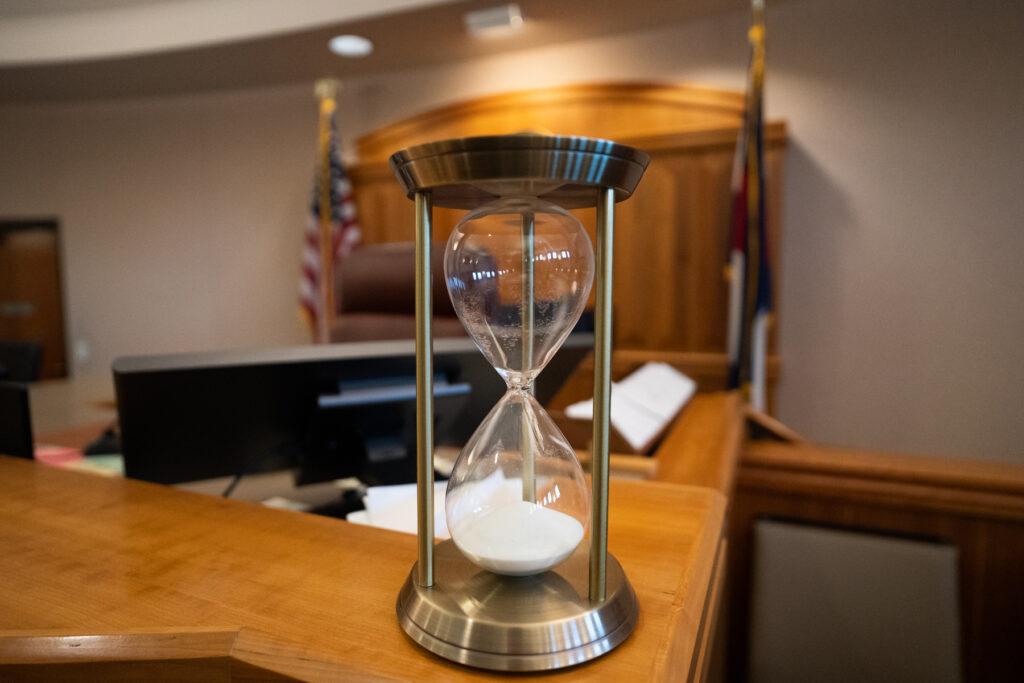
Gilpin County resident Jason Hernandez has had a few minor scrapes with the law — a marijuana grow back in the 2000s, driving without a license, having dogs off-leash that then went and chased Animal Control.
Hernandez, 43, said he has often pleaded guilty for these various infractions just to move on, get it over with, go back to work.
“It’s easier for people, they don’t really want to waste their time,” he said recently, standing outside a Jefferson County courtroom after agreeing to bring in proof his dogs are licensed as part of a deal he struck with prosecutors. “The public defenders may give you a good deal but they don’t see it in the long run but when I get my record pulled up at some point, people will see that you’re in the system.”
In Colorado and across the country, Latinos plead guilty more often than white or Black defendants, according to the first-ever analysis of prosecution data in a handful of Colorado’s largest judicial districts representing the majority of the state.
The data also show Latinos’ cases, particularly low-level ones, are not dismissed as much as cases for white or Black defendants. And their incarceration rates are higher for the same crimes.
“A lot of people just plead guilty to get out of there,” Hernandez said.
Even for those in law enforcement, the inequalities around Latino defendant data stand out.
“I worry about our Latino community resolving cases very, very quickly,” said Alexis King, the district attorney for Jefferson and Gilpin counties. “I worry about informed representation on the other side. I worry about them understanding the programs we have available. I’m not a social scientist but I want to learn about how to address these things.”
In King’s judicial district, after taking into account individual and case characteristics, new data estimates that 70 percent of whites and Blacks pleaded guilty in their cases yet 74 percent of Latinos pleaded guilty between 2017 and 2022.
Likewise, that same data shows prosecutors routinely dismiss lower-level cases for white defendants more often than Latino defendants. They also offer white defendants eventual paths out of the criminal justice system, including deferred judgments, more than Latino defendants. Those lower-level charges include driving without insurance, driving with a revoked license and misdemeanor assaults.
“We expected to see disparities because we understand there is systematic racism throughout our culture and community and we reflect that back,” King said. “But nationally, a lot of the conversation focused on Black people in the criminal justice system, and rightfully so given our history, but in Colorado, we have such an amazing Latino community and it doesn't always have the same focus in conversation.”

Disparities in low-level offenses
The inequity data has sparked large conversations about how Colorado’s second-largest racial or ethnic group is treated when Latinos enter the criminal justice system — particularly in the vast majority of non-serious cases, which show the biggest disparities.
Advocates, prosecutors and researchers say there are likely multiple barriers to pleading not guilty and fighting the charges, rather than just taking a deal offered by prosecutors and pleading guilty in today’s criminal justice system.
Those barriers include systemically racist rules prohibiting offers for plea deals to undocumented defendants, worries about the prospect of burdensome probation agreements, fears of immigration reporting and fears about missing work for multiple future court dates.
There is also a Spanish interpreter shortage in Colorado, and many low-level cases are handled with interpreter help over the phone.
Denise Maes, a criminal justice reform advocate who has lobbied at the state Capitol for more than a decade, said each story behind every number in the data is personal.
“If the plea agreement you want is not the plea agreement you’re going to get, you’re stuck. It’s like, hey, it’s not going to get better for you at trial, so plead guilty now or face more time,” she said. “And I think you’re more apt to take the deal you can get.”
Inside the court on a weekday
On a recent Wednesday at the Jefferson County courthouse, a line of people waited for first advisement on mostly low-level charges filed the night before: driving while ability impaired, driving without a license, without insurance, some faced summons for low-level assault.
Most of them didn’t speak with the public defender, who sat at the table opposite the large team of young prosecutors. The public defender was dealing with the slightly more serious cases, including those defendants in custody.
After checking in, the low-level defendants would wait, often with families and children in tow, in the courtroom’s wooden benches before being called by an assistant district attorney. Then the two of them, the DA always cradling a laptop, would go out to the hallway and sit on a bench or on a window well to talk about what the prosecutor was offering.
Those who didn’t speak English had to wait, sometimes at length, for an interpreter, who could be called on a phone in another room.
It’s at this stage, Hernandez and others say, that people just want to get all this over with and make decisions to cut a deal.
But Megan Ring, the state’s lead public defender, warns that pleading guilty to these kinds of small cases can have a real snowball effect in someone’s life.
“You plead guilty and then the next time you get pulled over, now it’s jail time. The number of clients who get pulled over for some cracked windshield and unfortunately had a little bit to drink and now it’s a DUI … and now that’s become really serious,” she said. “We don’t want people sitting in custody, but I think there are interesting other ramifications when people get a summons because they’re less likely to come see us.”
Ring said a future court date means more time off work, more travel to some hard-to-reach courthouse.
“The system is really confusing and if someone says to you, you can just plead guilty and you’re done today, I can see it,” she said.

Daily churn of cases
Even some prosecutors agree with this. Researchers say that the greatest inequities in the criminal justice system happen at the lowest levels, the day-in and day-out churn of traffic violations and low-level misdemeanors.
The small-time cases don’t get as much attention by anyone: the media, the public defenders, the criminal justice advocates, the prosecutors. No one has taken a microscope to why some people plead guilty to third-degree assault more than others. They’re often handled by the least experienced prosecutors who are given instructions on standard offers of pleas for first-time offenders.
“I’m sure anyone faced with this has to go through the mental calculus of, is this something I should take another day off for? Do I have child care? Do I have to take another bus to the courthouse? That certainly probably plays into the decision process,” said Arapahoe County District Attorney John Kellner, whose data also reflects Latino defendants pleading guilty more often than others. “I’ve seen cases that drag on for many more months longer than they would. I’ve seen cases get reset because there wasn’t an interpreter at the time. Those are all burdens.”
The data shows there isn’t as much inequity in the bigger, more serious, criminal cases. That’s because, as University of Denver researcher Lauren Gase points out, there is a lot more discretion among prosecutors and defense attorneys about how to proceed than with serious criminal cases.
“It’s much more than just prosecutors,” said Gase, who is the Prosecutorial Dashboards Project director at the Colorado Evaluation and Action Lab at the University of Denver.
Gase helped the state’s prosecutor offices analyze their data. “Thinking about the courts, translation services, court navigation services, public defenders … I think it’s a whole system issue.”
Immigration status and fears
Researchers and defense attorneys say much of the disparity among Latino defendants pleading guilty more often could be explained by worries about what would happen with immigration authorities if they fight charges.
Ring, who was a public defender in Boulder County before getting the promotion to run the whole state office, said she felt that fear with her clients all the time.
“You did get this extra sense of fear about if you were not a citizen, what did it mean? If you didn’t get out of jail right away, did that mean you were going to get an immigration hold? Should you take whatever it took to get out of jail?” she said. “Not every jail contacts ICE but some do … There is just pressure around, especially, non-citizens about losing their job or even missing one day of work. I think there are additional pressures.”
For Kellner, he’s worried about access to justice issues for non-English speakers trying to navigate the criminal justice system.
“It is something that really concerns me is do we have sufficient translator resources so that people can make decisions where they don’t have to feel overly rushed to come to that decision to plead guilty or not guilty,” he said. “Because that to me is a baseline access to justice question.”

Potential solutions
Several years ago, before the pandemic, Larimer County’s Chief Judge Susan Blanco decided she wanted her main courthouse in Fort Collins to be a more welcoming place — particularly for immigrants and people of color coming in for help.
“I don't totally have control over who the district attorney decides to file charges against or who the police are making contact with. Or why are people calling 911,” Blanco said. “But once you come into my building, what can I do to help serve you?”
Over the past several years, she has added court navigators, or sherlocks, to help people in Spanish and English with court matters and to do things like filling out protective order forms.
She installed QR codes all over town, at community centers and libraries, that people can swipe with their phones to enter a room with an interpreter who can offer help. She updated the general advisement to be more conversational and easier to understand. She also got a Spanish-speaking judge to record it colloquially.
She worked on explaining the concept of probation to people who didn’t understand it before — and tried to make it clear what rights people were giving up when they pleaded guilty to a crime.
Blanco has also tried to hire more Spanish-speaking therapists to provide the court-ordered services and addiction counseling often required in probation agreements by working with graduate students at Colorado State University.
And in every speech she gives around town, she tells people ICE has no presence at the Larimer courthouse.
“It really bothered me that people were afraid to come inside,” Blanco said. “We want to build that relationship and trust so that people can come to us for help.”
Jefferson County DA King is also working on a few things to help: She’s trying to work with the DMV to bring in a navigator so those involved in cases of driving without a license or without insurance can be taken care of right in the courthouse.
King also reversed a policy to allow non-citizens the opportunity for deferred judgments — which are agreements to plead guilty, work with probation for a time, and then have the guilty conviction withdrawn if the defendant meets certain requirements.
The previous district attorney had prohibited these agreements for undocumented immigrants, which King said may have contributed to her county’s inequities.
King has also put together a team of people to study sentencing options and expand alternatives out of the criminal justice system, including diversion for property crimes.
“You kind of create an attitude towards a certain group, even if that wasn’t the intent,” King said. “I think we have some cultural hangover in this office.”
More stories about justice and public safety in Colorado:
- Prosecutors can now charge the dealers behind fentanyl overdose deaths. But the cases are hard to solve, and ever-growing
- The latest free speech battle from Colorado going before the US Supreme Court will test the state’s stalking laws
- A look behind Colorado’s decentralized system of coroners who investigate death every day
- Domestic violence deaths are up in Colorado. The pandemic and firearms access are likely reasons why
- Lawsuit alleges one former Grand Junction nurse sexually assaulted potentially ‘thousands’ of victims








